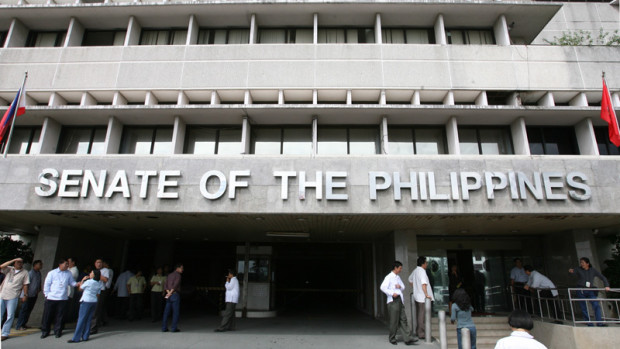Senate concurs in ratification of treaty banning nuclear weapons

Senate of the Philippines. (File photo by EDWIN BACASMAS / Philippine Daily Inquirer)
MANILA, Philippines — The Senate on Monday concurred in the ratification of a treaty that would ban the development and use of nuclear weapons.
Twenty three senators voted to adopt Senate Resolution No. 620 expressing the chamber’s concurrence in the ratification of the Treaty on the Prohibition of Nuclear Weapons (TPNW).
The TPNW is the “first globally applicable multilateral agreement to comprehensively prohibit nuclear weapons on the basis of international humanitarian law,” according to Senator Aquilino “Koko” Pimentel III, who sponsored the resolution on the floor as chair of the Senate foreign relations committee.
The treaty prohibits state parties from “developing, testing, producing, manufacturing, transferring, possessing, stockpiling, using or threatening to use nuclear weapons; assisting, encouraging or inducing anyone to engage in said activities; and allowing nuclear weapons to be stationed, installed or deployed in their respective territories.”
The international pact also obligates states to provide assistance to individuals affected by the use or testing of nuclear weapons, and to take appropriate measures toward the environmental remediation of contaminated areas.
Article continues after this advertisementAdopted during a United Nations conference on July 7, 2017, the treaty was signed by then Foreign Affairs Secretary Alan Peter Cayetano on September 20, 2017.
Article continues after this advertisementPresident Rodrigo Duterte ratified the treaty more than three years later, on November 18, 2020, and then submitted it to the Senate for concurrence.
The 1987 Constitution requires concurrence by at least two-thirds of the 24-member Senate before any international agreement that the Philippines signs become binding.
Pimentel said the Philippines is among the first states to sign the treaty, along with other 52 countries.
As a signatory to the treaty, the senator said the Philippines has “much to gain,” citing the TPNW’s provisions on victim assistance and environmental remediation.
“Nuclear weapons do not discriminate. We cannot afford another nuclear arms race. The Hiroshima and Nagasaki bombings in Japan are horrors that should never be repeated,” Pimentel stressed.
Senator Risa Hontiveros, among the co-sponsors of the resolution, said nuclear weapons have “humanitarian and environmental consequences that span decades and cross generations.”
“The TPNW is groundbreaking and a step in the direction of creating an international norm of conduct,” she said.
“With 86 nations signing it and 52 so far ratifying it – perhaps we will be the 53rd – the collective voice of humanity is clear: nuclear weapons should be banned forever, as we have banned landmines and biological and chemical weapons,” she added.
For his part, Senator Joel Villanueva, another co-sponsor, said that while the “prevalence of weapons of mass destruction among the major world superpowers” is the “reality on the ground,” he believes that the TPNW is a “stepping stone to a nuclear weapons-free world.”
“Our children can never feel safe knowing that nuclear arsenals are still very much present,” he added.
“Total nuclear disarmament may only be a hope for the present but with the ratification of this treaty, we are taking one step further to achieving a future without a threat of total human annihilation from a single weapon of mass destruction,” Villanueva further said.